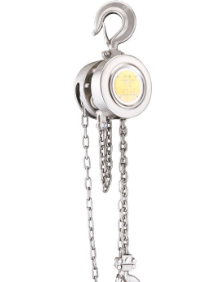




Stainless steel chain hoists are commonly used for operations in humid environments, and seawater has a stronger corrosiveness to metals. Therefore, the demand for stainless steel chain hoists is more evident when carrying out lifting operations at sea.

So why is seawater more corrosive to metals?
Firstly, the sea itself is a relatively humid environment, and the corrosion of chain hoists is evident in such environments. Through a series of chemical reactions, chain hoists are oxidized. Another issue is that seawater contains a large amount of electrolytes, and steel contains iron and carbon to form the primary battery. Iron serves as the negative electrode, and losing electrons leads to oxidation, resulting in the corrosion phenomenon of electrochemical reactions.
Under the joint promotion of two corrosion reactions, the corrosion of metal materials is further accelerated.
So when carrying out lifting operations at sea, it is more important to use high-quality stainless steel chain hoists. Stainless steel chain hoists use 304 stainless steel, which has stronger corrosion resistance and rust resistance compared to ordinary stainless steel chain hoists, greatly improving their service life in this environment.
